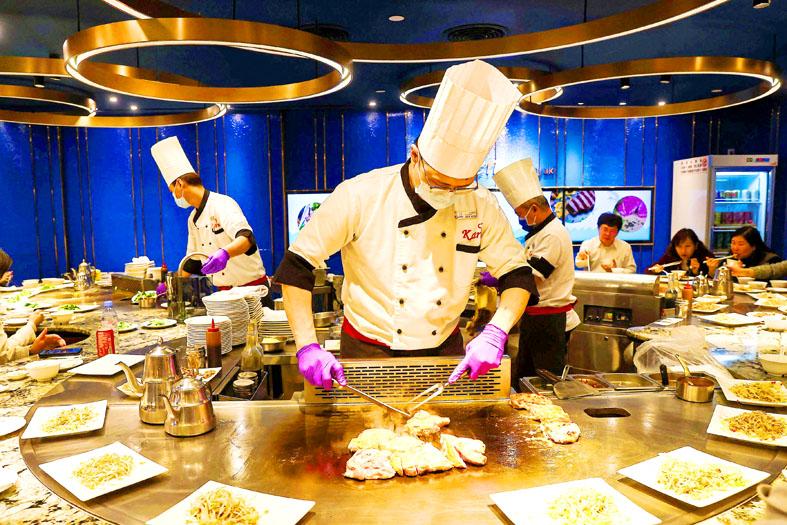The government’s business climate monitor remained “yellow-red” in January, suggesting the nation’s economy was still strong, although it slightly lost momentum, the National Development Council (NDC) said yesterday.
The total score of all constituent readings was 36, down 2 points from a month earlier, as the TAIEX and business confidence softened a bit, the council said.
The local bourse swung wildly in January amid heightened geopolitical tensions and unease over interest rate hikes by major global central banks, NDC research director Wu Ming-huei (吳明蕙) said.

Photo: Ann Wang, Reuters
The council uses a five-color system to depict the nation’s economic state, with “green” indicating steady growth, “red” suggesting a boom and “blue” signaling a recession. Dual colors indicate a shift to a stronger or weaker state.
The decline in points should not be seen as signaling an economic turnaround, because Taiwan’s economy has plateaued, Wu said.
Russia’s invasion of Ukraine has so far had little impact on Taiwan, as the nation has little trade with either country, Wu said, adding that the fallout would likely be limited to the financial sector, as global expectations of supply disruptions have boosted the prices of oil and grain.
Russia is a major producer of crude oil and grain.
Wu cited robust exports, a strong local currency and general pay hikes as evidence that Taiwan’s economy has held firm.
The index of leading indicators, which is used to predict the economic situation in the coming six months, shrank 0.06 percent from a month earlier to 102.08, the council said.
The sub-indices on export orders and payrolls in the industrial and service sectors increased, while the remaining measures all declined, it said.
The index of coincident indicators, which reflects the current economic state, expanded 0.32 percent to 103.16, as utility consumption picked up and wholesale, retail and restaurant revenues improved, it said.
In related news, the consumer confidence index last month shed 0.48 points to 73.19, a National Central University survey showed.
People became more confident about job hunting, the economic outlook and household income, tipping the sub-indices up to 65.3, 77.9 and 90 respectively, the university said.
However, they were less satisfied with consumer prices, stock investments and purchases of durable goods, driving the readings down to 30.45, 49.7 and 125.8 respectively, it said.
Confidence values of 100 or more indicate optimism, while values lower than the threshold suggest pessimism.
The university polled 2,813 people by telephone from Feb. 18 to 21.

MULTIFACETED: A task force has analyzed possible scenarios and created responses to assist domestic industries in dealing with US tariffs, the economics minister said The Executive Yuan is tomorrow to announce countermeasures to US President Donald Trump’s planned reciprocal tariffs, although the details of the plan would not be made public until Monday next week, Minister of Economic Affairs J.W. Kuo (郭智輝) said yesterday. The Cabinet established an economic and trade task force in November last year to deal with US trade and tariff related issues, Kuo told reporters outside the legislature in Taipei. The task force has been analyzing and evaluating all kinds of scenarios to identify suitable responses and determine how best to assist domestic industries in managing the effects of Trump’s tariffs, he

TIGHT-LIPPED: UMC said it had no merger plans at the moment, after Nikkei Asia reported that the firm and GlobalFoundries were considering restarting merger talks United Microelectronics Corp (UMC, 聯電), the world’s No. 4 contract chipmaker, yesterday launched a new US$5 billion 12-inch chip factory in Singapore as part of its latest effort to diversify its manufacturing footprint amid growing geopolitical risks. The new factory, adjacent to UMC’s existing Singapore fab in the Pasir Res Wafer Fab Park, is scheduled to enter volume production next year, utilizing mature 22-nanometer and 28-nanometer process technologies, UMC said in a statement. The company plans to invest US$5 billion during the first phase of the new fab, which would have an installed capacity of 30,000 12-inch wafers per month, it said. The

Taiwan’s official purchasing managers’ index (PMI) last month rose 0.2 percentage points to 54.2, in a second consecutive month of expansion, thanks to front-loading demand intended to avoid potential US tariff hikes, the Chung-Hua Institution for Economic Research (CIER, 中華經濟研究院) said yesterday. While short-term demand appeared robust, uncertainties rose due to US President Donald Trump’s unpredictable trade policy, CIER president Lien Hsien-ming (連賢明) told a news conference in Taipei. Taiwan’s economy this year would be characterized by high-level fluctuations and the volatility would be wilder than most expect, Lien said Demand for electronics, particularly semiconductors, continues to benefit from US technology giants’ effort

‘SWASTICAR’: Tesla CEO Elon Musk’s close association with Donald Trump has prompted opponents to brand him a ‘Nazi’ and resulted in a dramatic drop in sales Demonstrators descended on Tesla Inc dealerships across the US, and in Europe and Canada on Saturday to protest company chief Elon Musk, who has amassed extraordinary power as a top adviser to US President Donald Trump. Waving signs with messages such as “Musk is stealing our money” and “Reclaim our country,” the protests largely took place peacefully following fiery episodes of vandalism on Tesla vehicles, dealerships and other facilities in recent weeks that US officials have denounced as terrorism. Hundreds rallied on Saturday outside the Tesla dealership in Manhattan. Some blasted Musk, the world’s richest man, while others demanded the shuttering of his